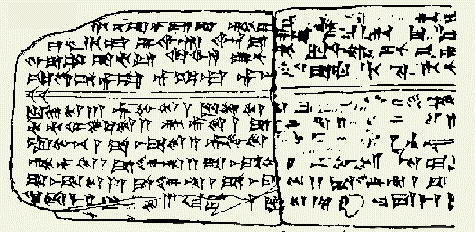A tablet with music on it was already around like 1400 BCE.

Guitar players are particularly clever, because they know how to use tablature without having to use tablets.
I’ve noticed for the last couple years my group seems to be getting new music digitally and then we print it on the band copier. I think they’re are using regular and cheap copy paper. The stuff is hard to read and the pages are paper thin. They don’t lie flat which is especially a problem in the summer at our outdoor concerts. The old large manuscript printed professionally was so much better to read, keep on the stand as well as being able to flip the page.Colby Fahrenbacher wrote: ↑Thu Oct 17, 2024 1:45 pm I've been wondering about the white vs. off-white paper color lately. We print parts on off-white, which our paper supplier helpfully describes as "natural", but many publishers (not all) print on solid white. My first thought was that the high contrast between white and black would make it generally easier to discern the ink, but I could see the opposite being true. The white paper would reflect more light than the off-white paper, but we don't need to see the white; we need to see the black. So maybe it puts more strain on our eyes because we are getting too much light from the part of the paper we NOT trying to read?
I wonder how dark/cursed mode would do for readability. Obviously this would pertain more to screen reading, since it would be rather...wasteful to color entire pages black except for the music. Putting aside how strange it would be to have everything inverted, I wonder if it would be easier in the long run.
Burn the trees to power the tablets . win/win?bloke wrote: ↑Thu Oct 17, 2024 4:39 pm @Colby Fahrenbacher
You DO realize how much more food humans must eat in order to power bicycles (all of that natural gas fracking, in order to create fertilizer, etc.) and - once at the gig - how much more coal, natural gas, or fuel oil must be burned in order to charge and power all of those tablets, yes?...and the child labor involved in harvesting the materials required to manufacture the batteries for all those tablets...
Further, converting trees into paper prevents those trees from dying and rotting and - were they to die and rot - those trees would be expelling untold amounts of carbon into the atmosphere...so paper - unquestionably - is THE environmentally responsible choice.
Besides all of the pitfalls I've listed in tablet use, I just can't imagine myself being that environmentally irresponsible.
OK...You called me out, and I'll admit it: I am a baby. I've never served in the armed forces nor fearlessly defended Europe...but I was a street captain on the safety patrol.
Do you have a link to said button? I use a pedal but quite often can't find it with my foot.
Broadly speaking, I think one thing worth keeping in mind is that going digital allows us to question our basic assumptions about many things involving music, including your question. There are a lot of aspects of music making that we assume have to be that way, but are really only tradition because they made sense at the time.russiantuba wrote: ↑Fri Oct 18, 2024 5:28 pm @Colby Fahrenbacher how do you feel going digital would change orchestral set up? Would the inner string parts operate the page turns? Watching this right now with paper music
As I am sitting tacet in Prokofiev, the larger size of the music seems to make it easier to see. I am not sure adding more stands on an orchestral stage is a good idea.
Why do you think I do so much tuba and recording repertoire?
You are centuries behind on the digital plane.